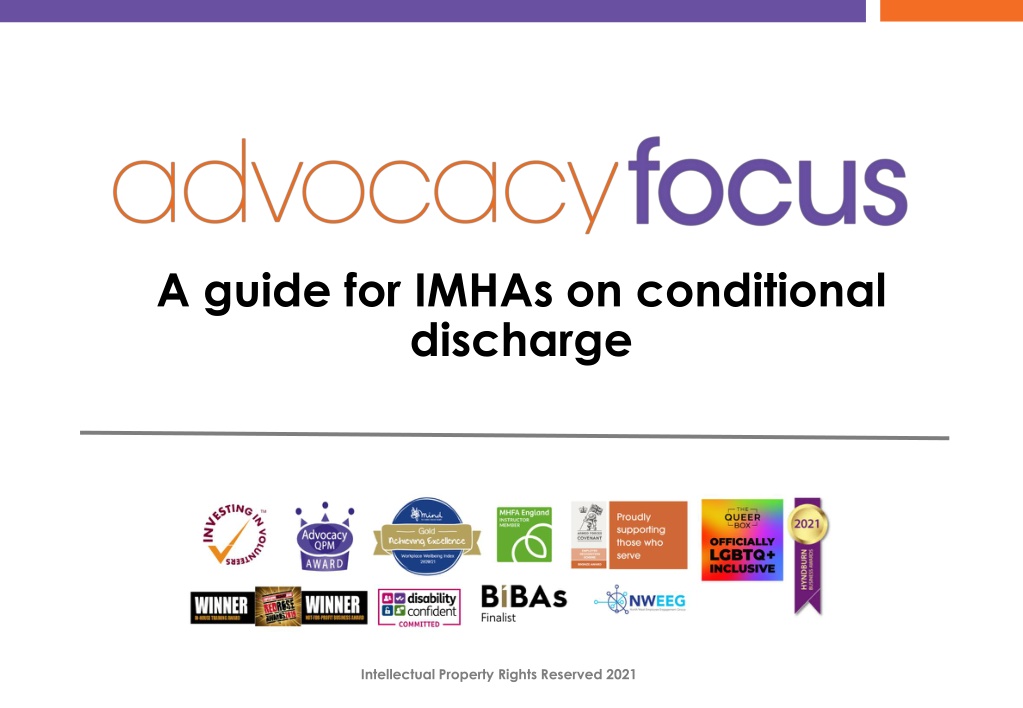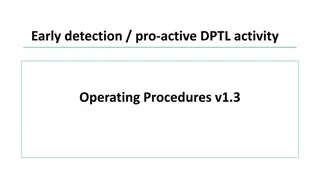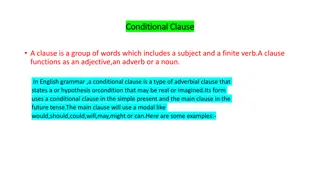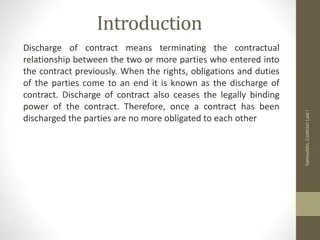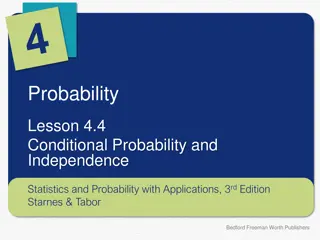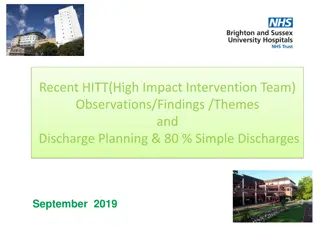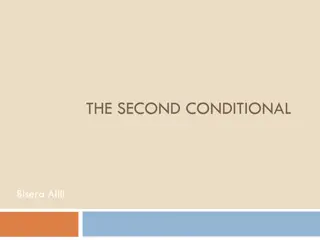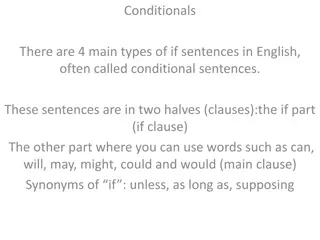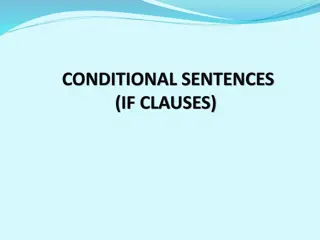Understanding Conditional Discharge in Mental Health: A Comprehensive Guide
Explore the complexities of conditional discharge in mental health, from its definition to planning for discharge and post-discharge care. Learn about conditions, frameworks, and recall procedures associated with this critical process. Delve deeper into the nuanced aspects of managing risks and protecting public safety in the context of conditional discharge.
Download Presentation

Please find below an Image/Link to download the presentation.
The content on the website is provided AS IS for your information and personal use only. It may not be sold, licensed, or shared on other websites without obtaining consent from the author. Download presentation by click this link. If you encounter any issues during the download, it is possible that the publisher has removed the file from their server.
E N D
Presentation Transcript
A guide for IMHAs on conditional discharge Intellectual Property Rights Reserved 2021
How did we get here? There is a lack of information available around conditional discharge. There is a lack of knowledge and experience about conditional discharge. People are being forgotten about and rights are being side-lined.
What is conditional discharge? Conditional discharge follows S37/41 detention in hospital for a criminal conviction. There is no guarantee of conditional discharge for a S37/41 patient. Conditional discharge will only happen if there are robust plans in place to manage risk of further offending. Conditional discharge can be indefinite. There is the power to recall someone back to hospital.
Planning for conditional discharge A restricted patient has the same right to advocacy in hospital as any patient on a civil section There is additional oversight from the Ministry of Justice when in hospital Discharge from hospital can be granted by the Tribunal or Secretary of State Discharge arrangements need to be robust to ensure public protection
More on conditional discharge Section 117 aftercare NHS Transforming Care There is no Nearest Relative There are no automatic tribunals
Conditions The conditions of discharge will be unique to each person. The purpose of the conditions is to provide a framework to reduce the person s risk of committing further offences. Conditions are linked to monitoring the person s mental health, how effective their after-care arrangements are and to protect the public.
Other frameworks Sex Offenders Register (SOR) Sexual Harm Prevention Order (SHPO) Multi-agency public protection arrangements (MAPPA) Victim Liaison Officer (VLO)
Recall The clinical or social supervisors can ask the Ministry of Justice to return the person to hospital for treatment. Breaching a condition will not automatically lead to recall. The person should be told about the reasons for recall at the time the recall happens unless there are exceptional circumstances and always within 72 hours.
Use of civil sections If the person is mentally unwell, the responsible clinician may choose to request admission under a civil section of the Mental Health Act (section 2 or 3). If the person has capacity, an informal admission for assessment or treatment in hospital could be an option. This would not constitute a recall.
Rights Right to an IMHA (free). Right to advice and representation from a solicitor (free). Right to apply for Absolute Discharge from the Tribunal or Secretary of State for Justice. Tribunal eligibility - 12-24 months, then 2 yearly. Right to request a variation of conditions. To make a complaint.
The role of the IMHA Independent mental health advocates (IMHAs) provide an additional safeguard for patients who are subject to the Act. They support patients to exercise their rights and ensure they can participate in the decisions that are made about their care and treatment MHA Code of Practice. Ch 6.1
Advocacy approaches Instructed advocacy Fluctuating capacity Non instructed advocacy Approach can include rights based, watching brief and person centred approach. Ensuring decisions follow the MCA
Meetings The person is entitled to Care Programme Approach (CPA) meetings. There is a possibility of Care and Treatment Reviews (CTR) meetings. There may be meetings about care and treatment that the person is invited to attend. There may be meetings about the person they are not invited to, such as risk assessment and planning meetings.
Reports The clinical and social supervisor have to send regular reports to the Ministry Of Justice (MOJ). The reports give feedback about the person s mental health and compliance with conditions.
Absolute Discharge If someone is absolutely discharged, they do not have any conditions to follow. They will continue to be eligible for free after- care under S117 of the Mental Health Act for as long as they need it. Any contact with the mental health team is voluntary, or for those that lack capacity, in their best interests and they cannot be recalled.
IMHA and absolute discharge The role of the IMHA is to support the person. The IMHAs role in Tribunals are the same as they are in civil section Tribunals. The IMHA can apply the SoS for Justice.
Jerry is a 60 year old man. Jerry has a learning disability and also has a diagnosis of schizophrenia. Jerry is living in a single person supported accommodation tenancy. Jerry has a 24/7 package of support. Jerry has been conditionally discharged from hospital for 3 years.
15 years ago Jerry was made subject to a Section 37/41 hospital order for a sexual offence. Jerry s conditions include naming his residence, meeting with his supervisors, preventing contact with children, and not going to the area where his victim lives. Jerry receives S117 after-care funding for his support and funds his accommodation and living expenses from his benefit.
Jerry tells you that overall he is happy with his life and most of the conditions of his discharge. Jerry says that he has not had any incidents during his discharge. Jerry does have 2:1 support for some activities but feels this is too much and he wants to bring that down to 1:1. Jerry wants you to come to his next CPA with him to help him ask for the 2:1 to be stopped.
You attend Jerrys CPA with him and support him to ask the attendees views on reducing his support level to 1:1. The MDT tell Jerry he is now doing really well with the current package of support in place. However the decision from the CPA is that the RC will not apply to reduce the restrictions.
Following the CPA, Jerry still wants to pursue reducing the 2:1 restriction to 1:1 You inform Jerry that he is entitled to apply for a Mental Health Tribunal, as he has not applied so far in the time he has been discharged. You support Jerry to find a solicitor and to explain his situation.
The Mental Capacity Act Secretary of State for Justice v MM [2018] UKSC 60 Birmingham City Council v SR and Lancashire County Council v JTA [2019] EWCOP 28 It is strongly in SR s best interests not to commit a further offence, or to place himself at risk of recall under the MHA, Queens Speech 2022 and reform of the Mental Health Act
Jerry has been assessed as lacking capacity to consent to the community-based accommodation and support arrangements, including the control and supervision element. Jerry s deprivation of liberty is authorised by the Court of Protection. Jerry s nephew is his rule 1.2 Representative Jerry uses a solicitor who can represent both under the MHA and MCA.
Jerrys Tribunal You go with Jerry to his Tribunal. Jerry is not successful in his support level being reduced You continue to support Jerry as IMHA going forward
Fast Forward Over the years Jerry develops a health condition that requires support of 1 staff member at all times Jerry s mobility declines and he requires a wheelchair when he leaves home. Jerry needs staff to push this for him.
It appears Jerry is no longer physically able to re-offend and there is no prospect of his health improving Jerry s DoLS reflects the new arrangements required for his care and support You plan with Jerry about raising this at his CPA
Jerrys CPA You help Jerry explain that he feels he is less likely to re-offend because of his health needs. The MDT decide to conduct a full risk assessment review. You remind Jerry that he is entitled to apply for a Tribunal. Jerry asks you to help him find a solicitor to help him with a Tribunal.
Jerrys Tribunal Jerry is granted an absolute discharge. The Tribunal accept that Jerry is now older, his health has no prospect of improvement and his health needs will always require support of at least one person at all times. Jerry is still subject to a CoPDoL and still receives S117 after-care.
The books https://advocacyfocus.org.uk/services/independent-mental-health-advocacy-imha/
Thank you Head Office: Advocacy Focus, First Floor, The Old Tannery, Eastgate, Accrington, BB5 6PW Office hours: Monday to Friday 9am-5pm Telephone: 0300 323 0965 Or chat to an Advocate online via our website. Email: admin@advocacyfocus.org.uk Find us on social media: Website: www.advocacyfocus.org.uk
